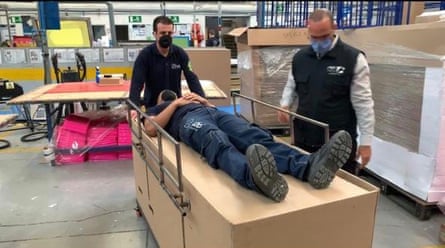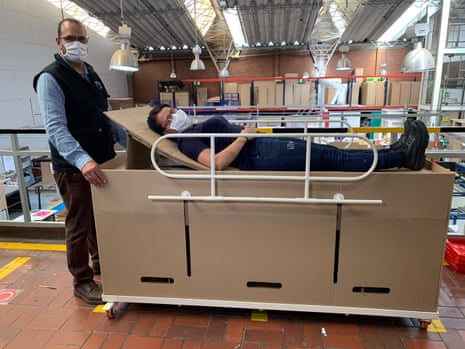A cardboard hospital bed that doubles as a coffin may seem morbid, but as Latin America emerges as the latest coronavirus hotspot, doctors have suggested it may be an innovation whose time has come.
With Covid-19 cases surging across the region, a team of Colombian designers came up with the idea as a grimly pragmatic solution for anticipated shortages of hospital beds and funerary caskets.
“We were shut down for a couple of months like everyone else, until we had this idea,” said Rodolfo Gómez, the founder of ABC Displays, which normally creates cardboard advertising props. “But when we saw what was happening in Ecuador, where bodies were piling up on the streets, we knew we had to prepare somehow.”
Colombia’s southern neighbour was the setting for one of the region’s first major outbreaks in April, when residents in the city of Guayaquil were forced to dump the bodies of their dead in the streets. In that instance, local authorities ended up distributing cardboard coffins to alleviate a shortage of funeral supplies.
Now, caseloads are quickly rising across the region: Brazil is second only to the United States in confirmed cases and deaths, and on Friday World Health Organization officials warned: “In a sense, South America has become a new epicenter for the disease.”

The prognosis for Colombia, now relaxing its two-month lockdown, is not good.
Confirmed cases are climbing at about 1,000 a day, with more than 20,000 people infected and more than 700 killed, suggesting that strict quarantine measures have done little to flatten the curve.
Colombia has about 8,000 intensive care beds for a population of nearly 50 million, and health professionals have already reported shortages in personal protective equipment.
Gómez says the company can produce up to 3,000 beds per month, and that each one, costing about $95, can support up to 150kg (about 330lb).
“People might say that we are making death beds, but we are trying to help during a crisis,” he added.
The company says it is fielding interest from potential clients in the US, Brazil, Mexico, Peru and Chile, and has promised to donate 10 beds to a hospital in Leticia, a hard-hit city in Colombia’s Amazon.
Some observers were unsure what to think of the macabre invention, suggesting that it may be a step too far.
“Is it ingenious or terrifying?” asked one Twitter user. “I still haven’t decided.”
But although the idea is unorthodox, doctors have not dismissed it out of hand.
“Honestly, if cases spiral out of control and there’s a desperate need for beds, and cheaply, then this could prove a pretty ingenious solution,” said Magda Tovar, a doctor in Bogotá, the capital.
